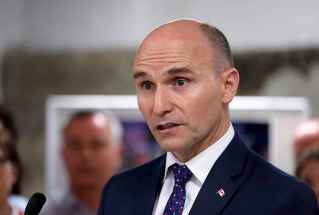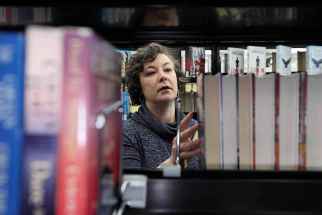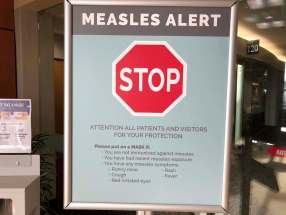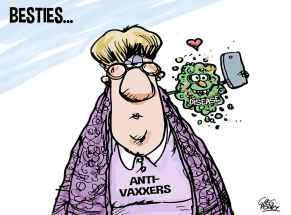Measles outbreak shows facts are not enough
Read this article for free:
or
Already have an account? Log in here »
To continue reading, please subscribe:
Monthly Digital Subscription
$0 for the first 4 weeks*
- Enjoy unlimited reading on winnipegfreepress.com
- Read the E-Edition, our digital replica newspaper
- Access News Break, our award-winning app
- Play interactive puzzles
*No charge for 4 weeks then price increases to the regular rate of $19.00 plus GST every four weeks. Offer available to new and qualified returning subscribers only. Cancel any time.
Monthly Digital Subscription
$4.75/week*
- Enjoy unlimited reading on winnipegfreepress.com
- Read the E-Edition, our digital replica newspaper
- Access News Break, our award-winning app
- Play interactive puzzles
*Billed as $19 plus GST every four weeks. Cancel any time.
To continue reading, please subscribe:
Add Free Press access to your Brandon Sun subscription for only an additional
$1 for the first 4 weeks*
*Your next subscription payment will increase by $1.00 and you will be charged $16.99 plus GST for four weeks. After four weeks, your payment will increase to $23.99 plus GST every four weeks.
Read unlimited articles for free today:
or
Already have an account? Log in here »
Hey there, time traveller!
This article was published 26/02/2019 (2483 days ago), so information in it may no longer be current.
Canada’s chief public health officer wants to counter a fast-spreading contagion — and she’s not just talking about measles.
In an interview with the Globe and Mail last week, Dr. Theresa Tam pointed out that the current re-emergence of measles dovetails with the spread of false information online. She says the Public Health Agency of Canada has begun working with social scientists in order to better understand where anti-vaccination beliefs come from, and will develop new social media campaigns informing and reminding people of the importance, efficacy and safety of vaccines.
It’s 2019, and there are nine confirmed cases of measles in British Columbia. In neighbouring Washington state, there are more than 60 cases. In both Canada and the U.S., national measles immunization rates are more than 90 per cent, but small, scattered clusters of unvaccinated people lead to not-so-small public health risks. Herd immunity only works if 95 per cent of the population is vaccinated.

Dr. Tam is correct — it’s impossible to divorce the current measles outbreak from the spread of misinformation online.
Pockets of people with anti-vaccination beliefs — which eventually lead into pockets of unvaccinated people — develop the same way any echo chamber does, online or off. Echo chambers are spaces in which ideas, information and beliefs are supported then enforced through repetition and validation by like-minded people, to the exclusion of outside/opposing viewpoints. And as measles adds more dates on its North American comeback tour, we’re seeing another critical example of how damaging these echo chambers can be.
Here’s the problem: many parents who are anti-vaccination or vaccine-reluctant believe their fears and mistrust in vaccines are founded. So when they are exposed to “studies” or “science” or scary “vaccine injury” videos on Facebook that reinforce those beliefs, usually passed onto them by people they trust, they believe they are indeed making an “informed” decision about the care of their children — even if the studies have been debunked, the science is junk and those videos are from unreputable, fear-mongering websites.
It only takes one group of parents to decide they are not going to vaccinate their kids to put people at risk — including babies who are too young for the MMR vaccine, people with weakened immune systems and, of course, people who have never been vaccinated.
Shame campaigns that remind parents we live in a society and that the personal choices of a minority should not dictate public policy have not worked.
In the WebMD, diagnosis-by-Google era, physicians and health-care providers would do well to have social media presences, something that Winnipeg-raised gynecologist Dr. Jen Gunter — often dubbed Twitter’s resident gynecologist for her work on the front lines battling medical misinformation — has advocated. Doctors can be the experts they wish to see in the world.
But while expert-informed, public health-endorsed social media campaigns are commendable and necessary, it’s important to remember that parents who are anti-vaccination aren’t only driven by misinformation. They are also driven by their emotions, most notably fear. And it’s all too easy for “feelings” to become “facts.” This is a small-but-vocal segment of the population that, historically, has been very hard to convince.
So far, information hasn’t worked. Facts haven’t worked. Shame campaigns that remind parents we live in a society and that the personal choices of a minority should not dictate public policy have not worked. We can and should encourage people to get informed and inoculated, but in the absence of real consequences for people and parents who fail to get their kids vaccinated, measles and misinformation will continue to spread. Apparently, the suffering of sick people is not consequence enough.









